Visiting the remnants of Nazi Germany in Munich can be a haunting yet illuminating experience. Exploring the Dachau Concentration Camp Memorial Site, the first Nazi camp established in 1933, offers a sobering window into the regime’s systematic oppression and dehumanization. Complementing this experience, a walking tour of Munich’s landmarks traces the rapid consolidation of Nazi power and the devastating consequences of unchecked prejudice. While these tours may be emotionally challenging, they provide essential historical insights that cannot be ignored.
Just The Basics
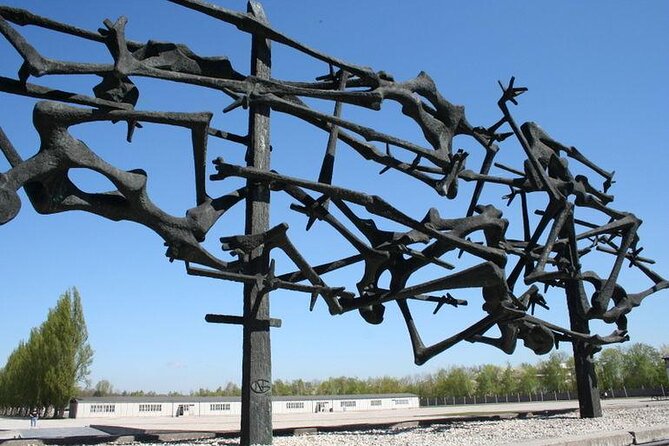
- Comprehensive tour of the Dachau Concentration Camp Memorial Site, the first Nazi concentration camp established in 1933.
- Guided exploration of historical Munich landmarks associated with the origins and rise of the Nazi party.
- Opportunity to learn about the Nazis’ systematic oppression and the atrocities committed within the Dachau camp.
- Tour provides insights into the rapid consolidation of Nazi power and the eventual downfall of the Third Reich.
- Flexible cancellation policy allows for hassle-free planning and the ability to obtain a full refund if necessary.
Overview of Dachau and Third Reich Tour
The tour provides a comprehensive exploration of the haunting remnants of Nazi Germany, beginning with a visit to the Dachau Concentration Camp Memorial Site, the first Nazi concentration camp established in 1933. Guests will see the camp’s somber reconstructed cell blocks, crematorium, and administration headquarters, and learn little-known stories about the Nazis’ atrocities.
The tour then transitions to a walking exploration of Munich, tracing the rise and fall of Adolf Hitler and the Third Reich. Visitors will witness historical sites like the building where Hitler first joined the Nazi party and the former headquarters of the Gestapo.
This small-group excursion offers an in-depth, thought-provoking look at the darkest chapter of 20th-century European history.
You can also read our reviews of more tours and experiences in Munich.
Exploring Dachau Concentration Camp Memorial Site
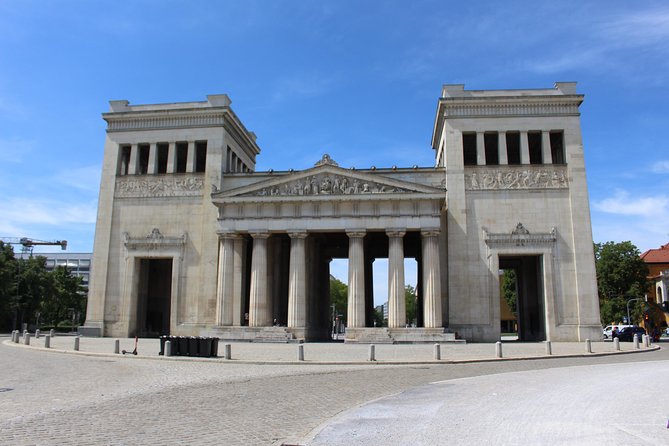
Visitors to the Dachau Concentration Camp Memorial Site can explore the somber remnants of this first Nazi concentration camp, which was established in 1933. The site features reconstructed cell blocks, a crematorium, and the former administration headquarters, where visitors can learn about the horrific history of this infamous camp. Through photographs, documents, and personal stories, the tour provides a deeply moving and educational experience. The memorial serves as a powerful reminder of the atrocities committed during the Holocaust and the need to prevent such tragedies from occurring again.
| Site Features | Significance |
|---|---|
| Reconstructed Cell Blocks | Illustrate harsh living conditions |
| Crematorium | Represents Nazi’s systematic murder of prisoners |
| Administration Headquarters | Symbolizes the bureaucratic nature of the camp’s operations |
Historical Significance of Dachau Camp
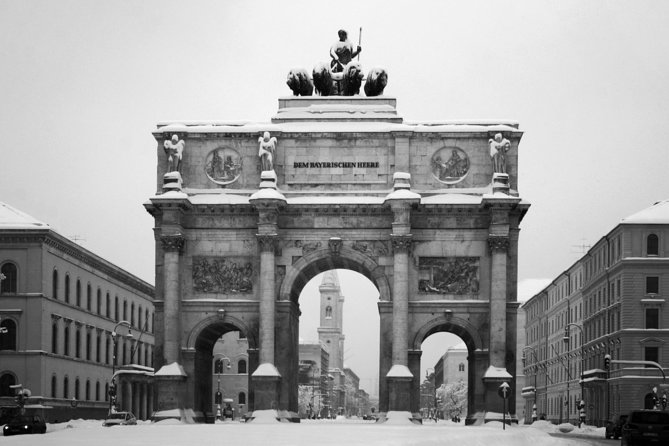
Dachau’s historical significance lies in its role as the first Nazi concentration camp, established in 1933 shortly after Adolf Hitler’s rise to power.
As the model for the Nazi’s extensive network of camps, Dachau exemplified the regime’s systematic oppression and dehumanization of political dissidents, religious minorities, and other ‘undesirables.’
The camp’s existence and the horrors perpetrated within its walls underscored the Nazis’ chilling disregard for human rights and foreshadowed the genocide that would unfold across Europe during the Holocaust.
Dachau’s legacy serves as a stark reminder of the devastating consequences of unchecked prejudice and totalitarian rule, and its memorial site continues to educate visitors about the atrocities of the Nazi regime.
Highlights From the Dachau Tour
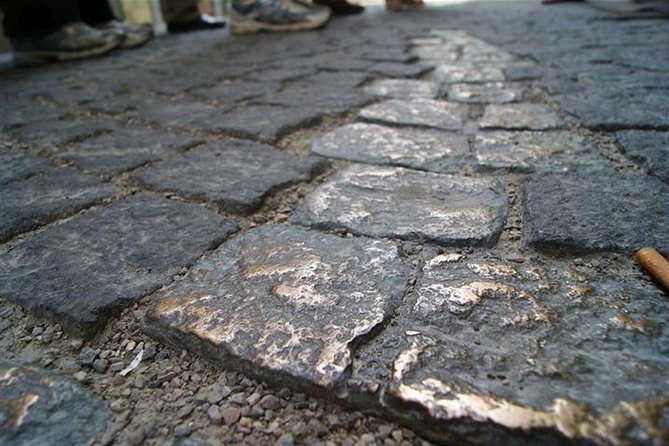
While Dachau’s tragic history looms large, the memorial site offers a powerful and educational experience for visitors. One can expect to see key highlights that bring the somber realities of the camp into stark relief. Visitors will tour reconstructed cell blocks, the crematorium, and the administration headquarters to gain a deeper understanding of daily life and the atrocities committed within the camp. Plus, the site features photographs, documents, and exhibits that shed light on the Nazis’ links to Dachau. Throughout the tour, the local guide shares little-known facts and stories, providing a sobering yet enriching look into this dark chapter of history.
| Dachau Memorial Site Highlights | ||||
|---|---|---|---|---|
| Reconstructed Cell Blocks | Crematorium | Administration Headquarters | Photographs & Documents | Guided Commentary |
Walking Tour of Nazi Munich Landmarks
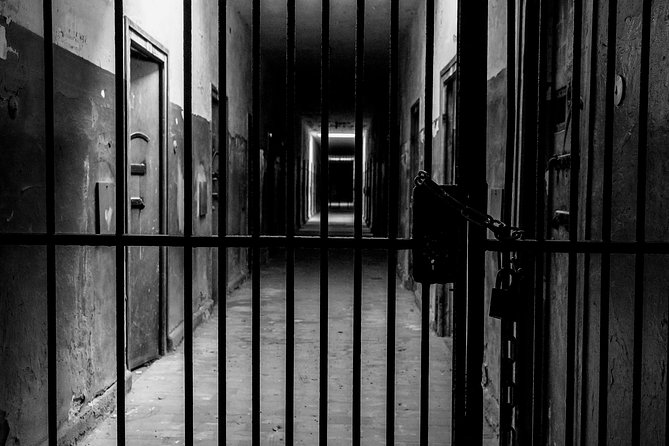
Exploring Munich’s Nazi-era landmarks offers a sobering look into the rise and fall of Adolf Hitler’s Third Reich. Guided by a local expert, this walking tour delves into the historical sites associated with the Nazi party’s origins and activities, from the building where Hitler first joined the movement to the former Gestapo headquarters.
Participants will learn how the Nazis consolidated power and implemented their chilling policies, including the planning of the Beer Hall Putsch, an early failed attempt to seize control of the government.
The tour provides crucial context for understanding the horrors of the Holocaust, making it a powerful complement to the Dachau Concentration Camp Memorial Site visit.
- Guided Dachau Concentration Camp Memorial Site Tour With Train From Munich
- Dachau Concentration Camp Memorial Tour With Train From Munich
- Dachau Tour From Munich
- Full-Day Dachau Concentration Camp Memorial Site Tour From Munich
- Dachau Small-Group Half-Day Tour From Munich by Train
- Munich World War II Sites Including Dachau Concentration Camp
Insights Into the Rise and Fall of Nazism
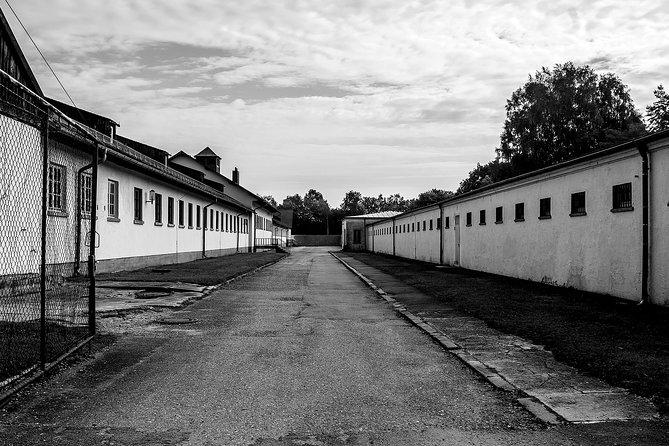
The tour’s exploration of Munich’s Nazi-era landmarks provides critical insights into the rapid rise and ultimate downfall of Adolf Hitler’s Third Reich, offering a sobering window into the party’s consolidation of power and implementation of their chilling policies.
Participants learn how the Nazis leveraged anger over the Treaty of Versailles, economic turmoil, and anti-Semitism to gain popular support and seize control of the German government.
The party’s ruthless suppression of opposition voices and the Gestapo’s oppressive methods of surveillance and control are also uncovered.
The decisive defeat of the Beer Hall Putsch coup attempt foreshadowed the Third Reich’s eventual collapse in the face of global condemnation and military defeat.
Logistics and Meeting Point
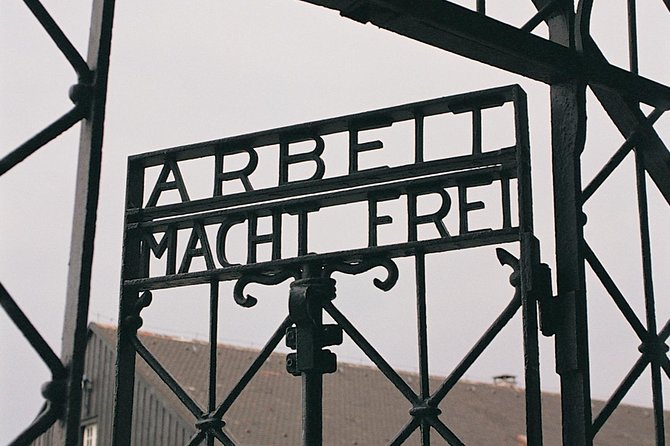
Kicking off the day at 9:00 AM, the tour meets at Dachauer Str. 4, 80335 München, Germany, providing a convenient starting point for the full-day exploration of Dachau Concentration Camp and Munich’s Third Reich sites.
This strategic location makes it easy for participants to gather before embarking on the immersive experience.
The tour lasts the entire day, allowing ample time to explore the historical significance of these powerful sites.
Fortunately, the tour operator offers hotel pickup and drop-off, ensuring a seamless start and end to the day’s activities.
With a small-group size capped at 25 people, the tour guarantees an intimate and personalized experience for all.
Cancellation Policy and Refunds
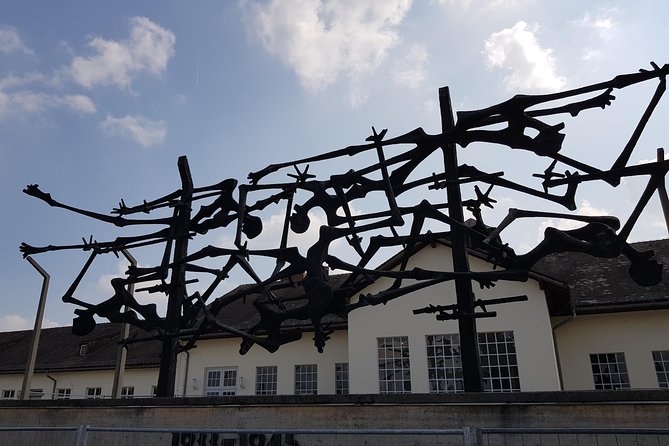
Cancellations up to 24 hours before the experience are eligible for a full refund, offering flexibility for tour participants. This policy ensures that travelers can plan their schedules without worrying about unexpected changes.
The tour provider understands that plans can shift, and they aim to accommodate their guests’ needs. Some key benefits of this cancellation policy include:
- Peace of mind for travelers who may need to adjust their plans
- Ability to recoup costs if the tour no longer fits into one’s schedule
- Opportunity to rebook the tour at a later date if desired
- Hassle-free process for obtaining a full refund within the 24-hour window
This flexible approach helps create a positive experience for all who embark on this fascinating exploration of Munich’s World War II sites.
Frequently Asked Questions
Is Photography Allowed Throughout the Dachau Site?
Photography is generally allowed throughout the Dachau Concentration Camp Memorial Site, though visitors are expected to be respectful and avoid disruptive behavior. Some areas may have restrictions or require guided tours for photography.
What Type of Clothing Is Recommended for the Tour?
The tour organizers recommend visitors dress comfortably in casual clothing suitable for the weather. Sturdy walking shoes are advised as there’s considerable walking during the tour. Visitors should also bring a jacket or sweater in case of cooler temperatures.
Can I Bring Food and Drinks Into the Dachau Memorial?
Visitors can bring food and drinks into the Dachau Memorial Site, but they’re encouraged to be respectful and mindful of the somber nature of the site. Food and drinks shouldn’t disrupt the solemnity of the memorial experience.
Is the Tour Accessible for Guests With Mobility Issues?
The tour is accessible for guests with mobility issues. The Dachau Memorial site and walking tour in Munich offer accommodations and adjustments to support visitors with limited mobility, though some areas may be difficult to access.
How Strict Is the Cancellation Policy for This Tour?
The cancellation policy for this tour is fairly strict – cancellations must be made up to 24 hours before the experience to be eligible for a full refund. Last-minute cancellations may not be eligible for a refund.
Final Words
This comprehensive tour provides a sobering and educational glimpse into the dark history of Nazi Germany.
Visiting the Dachau Concentration Camp Memorial Site and exploring key Munich landmarks offer a powerful window into the rapid consolidation of Nazi power and the devastating consequences of unchecked prejudice and totalitarian rule.
This tour serves as a sober reminder of the importance of vigilance and the fragility of democratic institutions.
More Tour Reviews in Munich
- Munich: Raven Black Witches and Executioners Walking Tour
- Munich: Night PubCrawl Shots and Party!
- Munich: Phototour – Your guide to beautiful photo spots
- Munich: Private or Group Third Reich and WWII Walking Tour
- Munich: Classic Guided City Tour by Bike (English Tour Only)
- Oktoberfest Tour: All in!!! Table reservation with 2 tickets for rides
Not for you? Here's more things to do in Munich we have recnetly reviewed
- Munich: Old Town Highlights Private City Tour – Walking Tour
- Munich Residenz: Master Concert in the Hercules Hall
- Munich: Private Walking Tour Munich Highlights
- Munich: River Surfing in MunichSurfing all you need to know
- Munich: Adventurous Bachelor Party Surf Experience – Munich
- Munich: Private Tour with a Local Guide
- Munich: Highlights Walking Tour with a Guide
- Munich Specials (choose!): OldTown, Dachau, 10Tastes, Spooky
- Munich: Wheelchair Rickshaw Tour through the English Garden
- Third Reich: Art, Cult and Ideology behind the tragedy
- Munich: Private Highlights Tour by Car – Private Tour Guide
- Secret Food Tours Munich
